Last month, the National Labor Relations Board surprised just about everyone when it granted the Northwestern University football players the right to unionize, if they choose.
But what does that mean for Northwestern? And what does it mean for the future of college football?
The NLRB's ruling made a big splash, but it's actually very narrow. For starters, the decision applies only to private schools. Not many play big-time college football, rarely more than one per major conference. The short list includes Duke, Rice, Vanderbilt, Stanford and USC. Further, the Northwestern players still have to vote to unionize this Friday, which seems far from a given. If the players do, in fact, vote to unionize, the university will appeal the NLRB's decision.
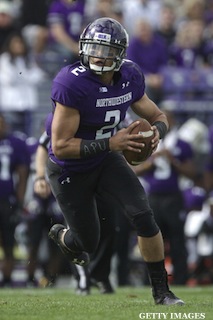
But graduating senior quarterback Kain Colter, who has led the charge, has been very shrewd, and will be hard to dismiss. I got to know him while researching my latest book, Fourth and Long: The Fight for the Soul of College Football, and can tell you he's one of the most impressive young men in the game, on and off the field.
In 2012, the season I followed for the book, Colter was Northwestern's leading returner in passing, receiving and rushing, surely the only player in the country who could claim that. He is also a psychology major who's taking the pre-requisites for medical school, which is why he often had to miss summer workouts to attend afternoon labs. The group he's formed -- the somewhat redundant College Athletes Players Association (CAPA) -- is also wisely not asking for money, but post-graduate health care for injuries suffered while playing. That seems like it will be pretty hard for any university -- which were created to improve the lives of its students, after all -- to argue against that. (To its credit, Northwestern -- which has a strong record of taking care of its athletes -- has not.)
Because he's a graduating senior, Colter is working for those who will come after him -- while potentially jeopardizing his appeal to the NFL teams who might draft him this spring. He's also underscored that Northwestern has been very good to him, from President Morton Schapiro to athletic director Jim Phillips to his coach, Pat Fitzgerald.
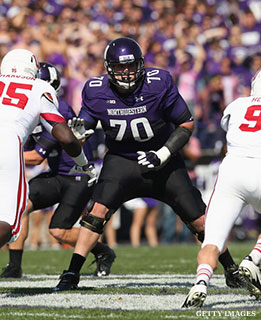
Northwestern is a model of how college athletics should be done, from its guaranteed scholarships to its 97-percent graduation rate. On the 2012 Wildcat squad I followed, offensive lineman Patrick Ward ran 6-foot-7 and 320 pounds, "but his most impressive stat is his 3.94 in mechanical engineering," Schapiro told me. "I'm hoping he goes to the NFL, but if not, he'll be the world's largest engineer."
Because Northwestern's players are in a better position than most, and their coach is very unlikely to exact revenge on those who vote to unionize, some have argued the players have a noblesse oblige, if you will, to take a stand for those players whose careers would be in jeopardy if they tried. If so, Northwestern's administration might not be blamed for feeling no good deed goes unpunished. Privately, they are said to be unhappy with Colter for not coming to them first before going to the NLRB, and the message boards indicate the Northwestern alums are less than thrilled to see their school depicted as something it certainly is not: A football factory.
So what's going to happen next? Anybody who claims they really know is either stupid or silly or both. We have never been here before. But we do know a few things already.
First, what CAPA is asking for is exactly what the NCAA, the leagues and the schools should have been providing for decades anyway: Health care for injuries student-athletes sustained while playing for their schools. In other words, the same protection the universities give their employees who are injured on the job -- and few jobs are more dangerous than football.
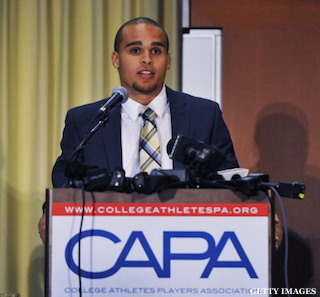
While they're at it, the NCAA should end the very cynical policy of allowing one-year scholarships. That's right: When an athlete gets a scholarship, it's not automatically a four- or five-year deal. The school can choose to renew each athlete's scholarship on a year-by-year basis, leaving him entirely at the mercy of the coach. For years, the NCAA required schools to offer only one-year scholarships, and only recently permitted schools the option of offering truly "full" scholarships, good for four years.
At an upright school like Northwestern, the players don't have much to worry about. The administration chose to offer only four- and five-year scholarships as soon as the NCAA let them, and in practice did so for decades anyway. But at too many other schools, the coaches exploit this shady arrangement every season.
A scholarship should automatically cover the players' entire education, even if their careers end due to injuries or disappointing play, so long as they're upholding their end of the deal. And they should keep that scholarship until they earn their degree, even after their eligibility runs out. It's difficult to finish a bachelor's degree while working 40-plus hours a week on your sport -- and that's what it takes, no matter what the NCAA claims.
Michigan quarterback Devin Gardner is a serious student, who asks more questions per hour than the rest of his classmates combined. I have seen this in person. He does very well in class, though not as well as he'd like. When I asked him for my previous book what he would be if he wasn't the Michigan quarterback, he thought about it, then said, "An 'A' student."
If the NCAA is serious about the "student" part of "student-athlete," now would be a great time to prove it.
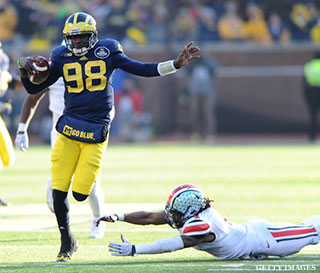
In light of the already obscene 750-percent increase in Division I head coaches' salaries the past three decades, the NCAA should also ban the practice of paying bonuses to head coaches, assistant coaches and even athletic directors for milestones the players themselves achieve. Last month, when Ohio State wrestler Logan Stieber won his third consecutive national title without a loss -- an incredible feat -- his athletic director, Gene Smith, automatically received an $18,000 bonus for Stieber's thousands of hours of work. Stieber, of course, couldn't take an extra dime.
Doesn't the non-profit NCAA find that outrageous?
The NCAA has greatly reduced the practice of "oversigning," but it still permits it on the margins. "Oversigning" occurs when unethical coaches promise more incoming freshmen scholarships than they have. When the players arrive on campus in August, the coaches conduct what amounts to an on-campus try-out to whittle their numbers down to the 25 scholarships they actually are permitted to give out. The "cut" players go home, having already turned down offers from other schools, and try to pick up the pieces.
If the NCAA rights these wrongs, I'd bet Colter and company – who didn't have to deal with these practices themselves -- call their efforts a success, and drop their campaign.
And there are good reasons why they might. Most college athletes are actually getting a pretty good deal. In my previous book, Three and Out, I calculated that an out-of-state, fifth-year senior at Michigan's free tuition, meals and travel come to at least $580,000 – and that doesn't count the cost of academic counseling and tutoring, strength and conditioning, or athletic training, not to mention the cost of those facilities, which is skyrocketing.
Tuition, room and board come to $65,554, the cost of one year at Northwestern, and the money spent on its athletes is higher still. If the student-athletes become employees, it's possible the IRS would require them to pay taxes on their scholarships, and all the other benefits they might receive.
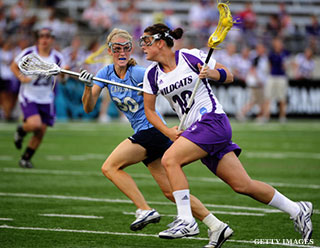
Another element few seem to have considered is the impact this could have on other teams at Northwestern, and the Olympic sports in general. Title IX has a higher winning percentage than even Nick Saban's Alabama teams, and it is unlikely to lose this battle, either. Whatever the football players get, the softball players won't be far behind. It's worth noting that sports in which both genders play -- think ice hockey, soccer and baseball/softball -- women have a higher rate of concussions. Their need for health care is at least as great.
If the players do unionize, and become employees of their schools, I also wonder if their new identity will diminish the appeal of college sports. College fans aren't attracted to excellence. Any pro team can beat any college team, in any sport. They're attracted to romance. Even though the Detroit Lions at their worst could crush University of Michigan at its best, the Wolverines draw twice as many fans. If the magic bubble bursts, college football fans might decide to stop supporting the venture -- as they have started to do even at hardcore schools like Penn State and Michigan -- and then who's paying the growing bills for all this?
Both parties should be careful what they wish for, or the law of unintended consequences could obliterate the benefits both sides receive. I honestly don't think the NCAA or the players have given the long-term ramifications of their actions very much thought.
For now, the NLRB's decision is less important legally than it is symbolically -- more Rosa Parks than Brown v. Board of Education. For the first time, a group of players has formally organized, and been officially recognized. And in the process, they've discovered they have no power -- until they threaten to sit down, together. Then, suddenly, they have all of it.
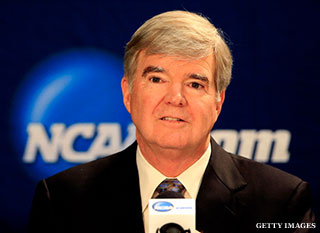
I hope the people who run college athletics are paying attention. The recent concession to allow walk-on players to eat the same training table meals as their scholarship teammates is a start. But the NCAA's hearing has been impaired for so long, I wouldn't bet on it.
When NCAA President Mark Emmert responded to the specter of unionization by saying it "would blow up everything about the collegiate model of athletics," the typically tone-deaf leader probably didn't realize that is exactly what his critics have been hoping for.
The NCAA should do the right thing -- look out for their "student-athletes," and get its own house in order -- and do it now, or risk losing everything.
That might seem like an easy decision to you and me -- but that's why we don't run the NCAA.
-- John U. Bacon is the author, most recently, of Fourth and Long: The Fight for the Soul of College Football, a New York Times bestseller. He gives weekly commentary on Michigan Radio, teaches at the University of Michigan and Northwestern's Medill School of Journalism, and speaks nationwide on leadership and diversity. Learn more at JohnUBacon.com, and follow him on Twitter @johnubacon.




